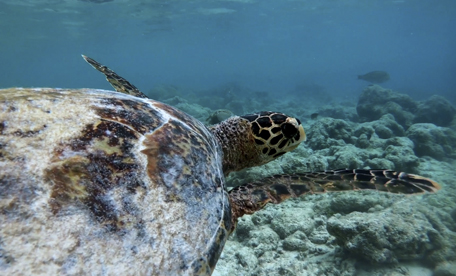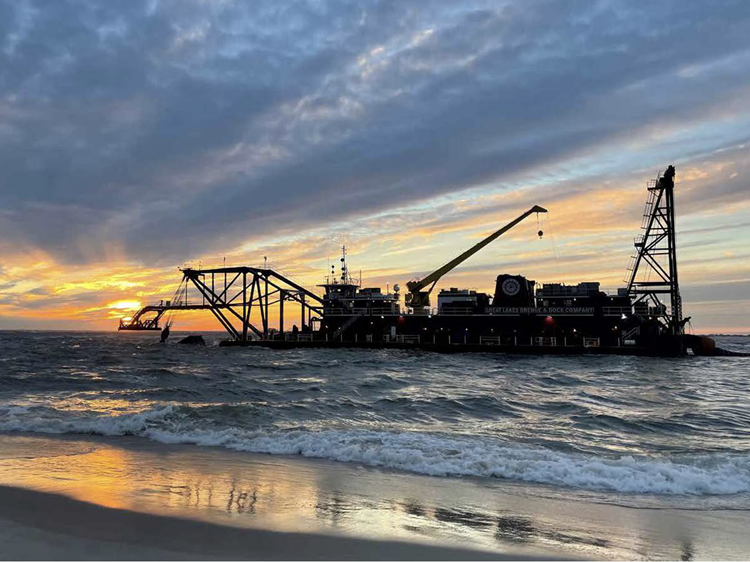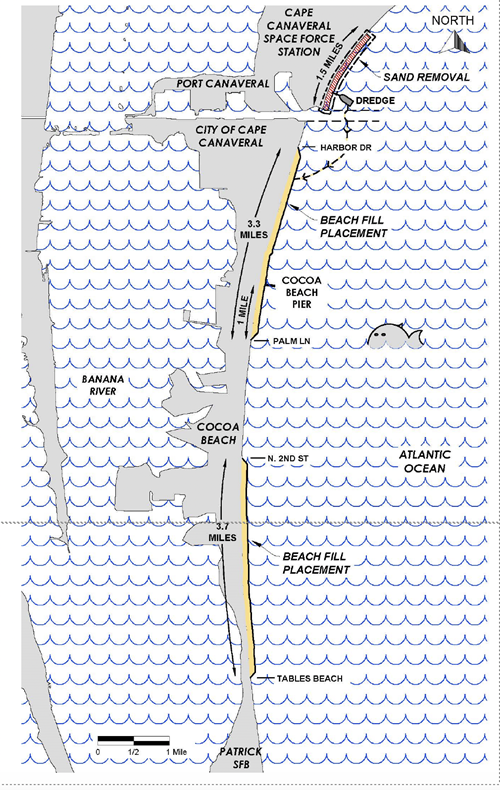
Environmental Stewardship
Environmental & Economic Harmonization
As a responsible governmental body, the Canaveral Port Authority is dedicated to safeguarding our environment while supporting Port Canaveral's economic growth. We maintain the highest standards to protect the environment in which we all live and work to provide benefits for the entire region.

Environmental Resources
Caring For Our Special Wildlife
The land and water in and surrounding our Port is home to a variety of “imperiled” species (includes species designated as endangered, threatened and of concern) that need special care to survive in tandem with a growing human population. Look for them when you visit and help us protect them by causing minimal disturbance to their lives.• Right Whales
• Manatees
• Turtles and Tortoises
• Birds
WE ASK BOATERS TO KEEP WATCH FOR MANATEES, WHALES AND TURTLES AND DO EVERYTHING POSSIBLE TO AVOID COLLISIONS WITH THEM OR ENDANGER THEM THROUGH OTHER ACTIVITIES.
Anglers
Please be aware of the threat of entanglement to birds, manatees, dolphins and sea turtles posed by fishing line left in the environment. Discard unwanted line in the collection bins placed at all of the Port’s boat ramps and fishing piers.
Right Whales
North Atlantic Right Whales are among the rarest mammals in the world, with fewer than 400 alive today. Between December and March, the whales travel annually to the coastal waters from 31 degrees 15’ N (Altamaha Sound, GA) to 28 degrees 00’ N (just north of Sebastian Inlet, FL) to bear their young. This is their only known calving ground.
Identification
Right whales have black skin with rough patches on their heads that appear white because of whale lice, plus a distinctive “V” shaped spout or blow when seen from front or back. They have no dorsal fin, their flippers are short and broad and their tail flukes are deeply notched with smooth trailing ridges. Adults are 45 to 55 feet long. Calves are 15 to 20 feet long and usually are by their mothers.
Protection Measures
This species spends much time close to the water surface, making it vulnerable to collisions with ships. The Port Authority provides annual support to the Marine Resources Council of East Central Florida for organization of a network of trained volunteers to report local whale sightings. Approaching vessels then are notified of right whales sighted in their area.Port Canaveral obeys other federal conservation laws to ensure right whales' survival such as: Right Whale Ship Strike Reduction Rule and the Right Whale 500-yard Approach Rule.
Boaters
Be vigilant and use the slowest safe speed during nighttime and other periods of reduced visibility. If you sight a right whale, treat it as you would another ship and take measures to avoid collision. Do not expect the right whale to get out of your way. Please identify the whale’s location by buoys or latitude and longitude, identify the direction of the whale’s travel and notify other ships in the area and the Florida Marine Patrol at 1-888-404-FWCC.
Manatees
The manatee, one of Florida’s best known imperiled species, use our waters for playing, resting, feeding, mating and travel between the Atlantic Ocean and the Indian River Lagoon. Due to their slow and docile nature, manatees are at significant risk of being injured or killed by boats.
Identification
The West Indian Manatee is a gray-brown aquatic mammal with a seal-like body, which tapers to a flat paddle-shaped tail. It has two small forelimbs. The head and face have thick, wrinkled skin with stiff whiskers on the upper lip. Manatees are nine to 13 feet long and weight between 1,000 and 3,000 pounds. They spend most of their time feeding and resting and usually surface every few minutes to breathe.
Protection Measures
The Port’s manatee protection program includes:
• State-of-the-art acoustic sensor system in the Canaveral Lock to prevent manatees being caught in the closing gates.• Fenders at piers and bulkheads that give manatees room to maneuver while vessels are being docked.
• Designation of all harbor waters as a “Slow Speed Zone.”
• Storm water outfall grates that prevent manatees from getting trapped in discharge pipes.
• Posting of manatee observers during dredging and in-water construction.
Boaters
It is illegal to harass, harm, pursue, hunt, shoot, wound, kill, annoy or molest manatees. Please observe all manatee speed zones and caution areas. To report manatee deaths, injuries or sightings of radio-tagged manatee, call the Florida Marine Patrol at 1-888-404-FWCC.
Manatee Fun Facts
• The manatee’s closest relatives are the elephant and hyrax (a small, gopher-sized mammal)\• The oldest living manatee is at least 63 years old
Turtles and Tortoises
Tortoises
The protected gopher tortoise is the only North American tortoise east of Texas. A significant population lives in the dune fringe along the Jetty Park beach. During construction projects at Jetty Park, special care is taken to avoid burrows and relocate the tortoises themselves to minimize stress.
The waters off the coast of Port Canaveral are home to Loggerhead, Leatherback, Green, Hawksbill and Kemp’s Ridley sea turtles. They are present year round but congregate near the coast in large numbers in spring and summer.
Protection Measures
To survive, night-born sea-turtle babies must head for the sea. Instinct leads them toward areas of bright light, such as the moonlit surf or, unfortunately, man-made lighting. Our Exterior Light Management Plan mandates limited pole heights, light shielding measures and special lighting in sensitive areas.
Boaters
Turtles must surface to breathe, making them vulnerable to collisions with vessels. Please keep a careful watch for their presence. Report dead or injured sea turtles to the Florida Marine Patrol at 1-888-404-FWCC.
Birds
The area around Port Canaveral is also home to a number of threatened and endangered bird species, including: least terns, brown pelicans, woodstorks, black-necked stilts, black skimmers, ospreys, scrub jays and roseate spoonbills. The Canaveral Port Authority has created and enhanced mangrove wetlands to increase shorebird habitat and posts and closes areas in which imperiled birds are nesting.
Both Jetty Park and Port’s End Park are listed as stops on the Great Florida Birding Trail. Other bird species that can be seen at these locations include: ruddy turnstones, spotted sandpipers, double-crested cormorants, great blue herons, and snowy egrets.Safeguarding the Quality of Our Vital Water Resources
In 1992, the Port Authority initiated a voluntary water quality monitoring program. Water samples from six stations in the Harbor and five stations in the Barge Canal are analyzed regularly, enabling us to identify short-term fluctuations and long-term trends in water quality.Stormwater run-off, if not handled properly, can contribute to water pollution. We regularly sample from Port stormwater outfalls and work to decrease contaminants by sweeping piers after cargo operations, cleaning pipes, installing stormwater treatment boxes and educating tenants on managing potential pollutants.
All new construction projects at the Port include stormwater retention systems. In addition, we retrofitted our stormwater system to redirect millions of gallons of run-off away from the Banana River, where it could possibly reduce salinity and compromise plant and sealife health, to retention ponds.
We also monitor water quality along the beaches south of the Port. In 2005, a study funded by the Port Authority and Brevard County and carried out by the National Oceanic and Atmospheric Administration concluded there was no evidence of a water quality problem in the form of elevated bacteria or nutrient levels along these beaches. However, to increase available data and maintain water quality, we’ve added additional monitoring stations.
Preserving the Natural Balance of Brevard’s Beaches
When our man-made inlet was opened, newly created water and wind patterns reversed the original southerly drift of sand along the Atlantic shoreline. This aggravated erosion of the beaches south of the jetties and build up of beaches to the north. Port Canaveral was the first deepwater port in the state to formulate a plan to minimize or reverse its effects on adjacent beaches. The Canaveral Harbor Inlet Management Plan includes pioneering strategies that are implemented through a partnership of the Canaveral Port Authority, the U.S. Army Corps of Engineers (Jacksonville District), the State of Florida and Brevard County:• Nearshore disposal of beach-compatible sediment dredged from the harbor. Roughly one-third of this sand has turned to the active beach.
• Sand-tightening and extension of the north and south jetties at the harbor entrance.
• The Canaveral Harbor Federal Sand Bypass Project, which transfers sand from the shoreline north of the harbor entrance to areas of shoreline south of the entrance. After more than 15 years of monitoring, the project is performing beautifully.
The Port Authority participates in other ongoing initiatives that include making inlet improvements, refining dredging practices, renourishing beaches and re-planting native dune vegetation such as sea oats to combat local beach erosion from all causes. But perhaps our most crucial ongoing role is in successfully courting federal and state funding for major beach restoration efforts throughout our region.
Additional information on the Canaveral Harbor Sand Bypass Project in section below.
Preserving the Natural Balance of Brevard’s Beaches
Canaveral Harbor Sand Bypass Project
For the latest updates on the Canaveral Harbor Sand Bypass Project CLICK HERE

The Canaveral Harbor Federal Sand Bypass Project, Phase VI, will dredge 1,500,000 cubic yards of sand from the shoreline north of Port Canaveral and place the sand along two beach areas south of the inlet: 3.3 miles along the City of Cape Canaveral & north Cocoa Beach, and 3.7 miles along south Cocoa Beach.
Project construction will be from November 2024 through April 2025. Work not constructed during that period will be completed from November 2025 through April 2026.
The project transfers sand from north to south across the inlet that has been interrupted by the federal inlet jetties and ship channel.
This is the sixth sand bypass project since its inception in 1995. The sand placement will initially widen the beach by about 100 feet, after which the sand will drift southward, maintaining Brevard’s beaches at their historical dimensions.
Project construction is managed and 100% funded by the U. S. Army Corps of Engineers. Additional design, permitting & monitoring is provided and funded by the Canaveral Port Authority (Project Sponsor), Brevard County (co-Sponsor), and Florida Dept. of Environmental Protection – with logistical support by the US Space Force SL Delta 45.
While construction moves along the beach, there will be temporary, local beach access closures for 2 to 4 days.

Notice to Mariners
Published by the US Coast Guard
Mariners are cautioned to strictly comply with the Rules of the Road when approaching, passing and leaving the area of operations, and remain a safe distance away from the dredge, buoys, cables, barges, derricks, wires and related equipment.
For more information CLICK HERE
For the latest updates on the Canaveral Harbor Sand Bypass Project CLICK HERE
Creating Artificial Reefs
In our sub-tropical environment, natural reef communities occur only where nature has provided a suitable hard substrate on the ocean bottom, usually in the form of limestone rock out-croppings, as a point of attachment and colonization for sponges, corals and a wide assortment of other invertebrates. Hard-bottom habitat is a very small percentage of the coastal ocean floor.In 1994 the Canaveral Port Authority began creating two artificial reefs 30 miles offshore (28deg 20.08min latitude; 80deg 12.23min longitude and 28deg 30.18min latitude; 80deg 13.18min longitude), using steel and concrete boats, concrete culvert pipe, a space shuttle booster mock-up, surplus Air Force tankers and a Titan rocket transporter. Since then we have partnered with fishing associations and local businesses to expand the two sites to 51.7 acres each.
Man-made reefs can be as productive as natural habitat and remain viable for hundreds of years, and ongoing monitoring ensures that the Canaveral sites are viable. A myriad of living organisms inhabit almost every square inch of these man-made structures.
Environmental Stewardship Fast Facts
Environmental Investments
The Canaveral Port Authority has long been a responsible community partner for healthy waterways. As Port guardians, one of our most important tasks is to protect this environment. Our land and waters must support the well-being and interests of our cruise and cargo partners, the coastal residential community, and Florida’s special animal and plant populations, many of which are unique to the Indian River Lagoon (IRL) environment. We are a workplace, a home, and a key component in ensuring the viability of our region’s ecosystem. That’s why we have been and continue to be fully engaged in sustaining healthy waterways for our region, particularly the IRL.
The Port has invested millions of dollars in stormwater improvements and environmental initiatives to ensure water quality and habitat protection. As stewards of Port Canaveral, the maritime asset entrusted to the Port Commissioners by the Florida Legislature and the people of the Port District, the Port has for decades proactively dedicated resources and invested in preventive measures and infrastructure to protect and improve the condition of the environment in and around the Port.
Spill Prevention, Control, and Countermeasures (SPCC)
Our hazardous materials and spill prevention plan exceeds federal, state, and local requirements, featuring rigorous preventive measures, regular staff training, and mandatory regulatory coordination.
Stormwater Management and Treatment
We have proactively invested millions of dollars in building and maintaining our infrastructure to ensure every drop of rainwater that falls on the Port goes through Port-owned and maintained stormwater treatment and retention systems with only clean water discharged in the Canaveral Harbor, not the Banana River.
Wastewater Treatment
Port Canaveral does not use septic systems. Port wastewater flows through a Port-owned and maintained sewer system to the City of Cocoa Beach advanced wastewater treatment plant.
Multi-Level Participation
Active membership in the Florida Shore and Beach Preservation Association underscores our commitment to coastal preservation. Additionally, Port representatives regularly engage with organizations such as the Indian River Lagoon National Estuary Program.
